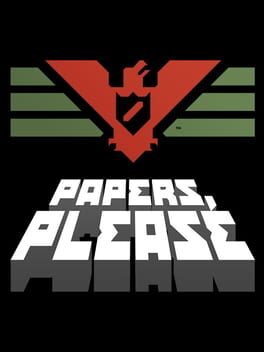It's really fun being a document inspector, what can I say. The feeling of trying to keep up with the ever-changing and growing rules of bureaucracy; cringing at how all these new documents you must inspect are eating at your throughput and limiting your income; rejoicing when two documents are merged to make your job simpler, only to realize that this change has doomed people whose documents are only 1 day behind. It's all what makes this game great. And the ending of trying to emigrate to Obristan with forged documents, documents you yourself would have denied, and the border inspector giving you and your family the pass is the perfect cherry on top.
The choices this game gives you, that are perfectly embedded in the play of being a border inspector, situate you as a precarious person in a precarious world. If you help others out, you receive citations and that hurts your paycheck. You can detain people, most of whom shouldn’t be detained, you receive kickbacks from the guard who works on a commission pay similar to your own, but even he doesn’t give you a fair deal at first, withholding money because he has to buy medicine. Every time you go off script, there’s that nervous thought, “is this the thing that gets me caught?” For example, I first figured that Sergiu was a spy looking to catch me breaking protocol. I felt imbedded in this world,
Maybe I’m just making excuses for this game because I like it, but I feel like the commentary isn’t as explicit as the obvious Soviet, “totalitarian” aesthetic would lead you to believe. Arstotzka is a dystopian autocracy, but so is this whole world. Kolechia is worse, and it seems like Obristan is better, but you can still receive asylum seekers from Obristan. Antegria and Republia have an absurd nationalistic fight over who can claim the city of Glorian (or True Glorian in Republia). Even EZIC values loyalty just as much as the government they’re revolting against, and has no issue with punishing those who betray them. It’s hopeless; there is no bright alternative. Every country on the map is bad like Arstotzka, just in different shades. It’s a fantasy world marked by dystopia that spreads in all directions. So I don’t see this game as trying to make a condemnation of anything; there wasn’t much urgency in 2013 to criticize the DDR for not allowing free movement of its citizens. I think, rather, there was an artistic fascination with the Soviet bureaucracy both in its ever-expanding rules and in its aesthetic. Now obviously this is based in a western perception of Soviet bureaucracy, but, with this game as an end result, I can’t really argue against the game’s aesthetic instinct.
The choices this game gives you, that are perfectly embedded in the play of being a border inspector, situate you as a precarious person in a precarious world. If you help others out, you receive citations and that hurts your paycheck. You can detain people, most of whom shouldn’t be detained, you receive kickbacks from the guard who works on a commission pay similar to your own, but even he doesn’t give you a fair deal at first, withholding money because he has to buy medicine. Every time you go off script, there’s that nervous thought, “is this the thing that gets me caught?” For example, I first figured that Sergiu was a spy looking to catch me breaking protocol. I felt imbedded in this world,
Maybe I’m just making excuses for this game because I like it, but I feel like the commentary isn’t as explicit as the obvious Soviet, “totalitarian” aesthetic would lead you to believe. Arstotzka is a dystopian autocracy, but so is this whole world. Kolechia is worse, and it seems like Obristan is better, but you can still receive asylum seekers from Obristan. Antegria and Republia have an absurd nationalistic fight over who can claim the city of Glorian (or True Glorian in Republia). Even EZIC values loyalty just as much as the government they’re revolting against, and has no issue with punishing those who betray them. It’s hopeless; there is no bright alternative. Every country on the map is bad like Arstotzka, just in different shades. It’s a fantasy world marked by dystopia that spreads in all directions. So I don’t see this game as trying to make a condemnation of anything; there wasn’t much urgency in 2013 to criticize the DDR for not allowing free movement of its citizens. I think, rather, there was an artistic fascination with the Soviet bureaucracy both in its ever-expanding rules and in its aesthetic. Now obviously this is based in a western perception of Soviet bureaucracy, but, with this game as an end result, I can’t really argue against the game’s aesthetic instinct.
